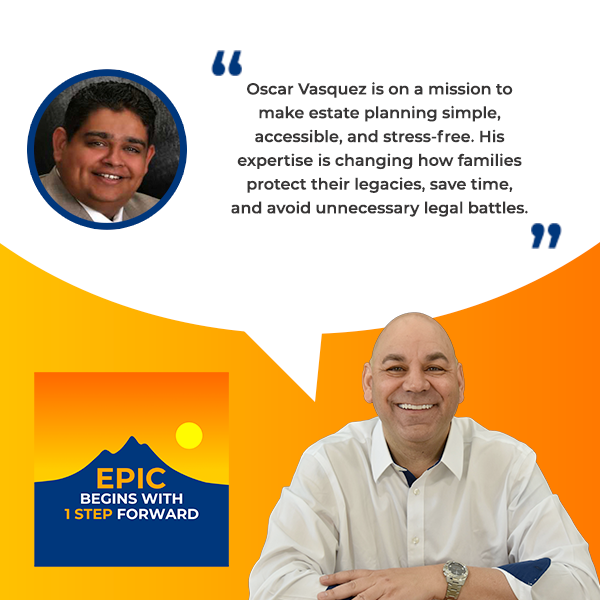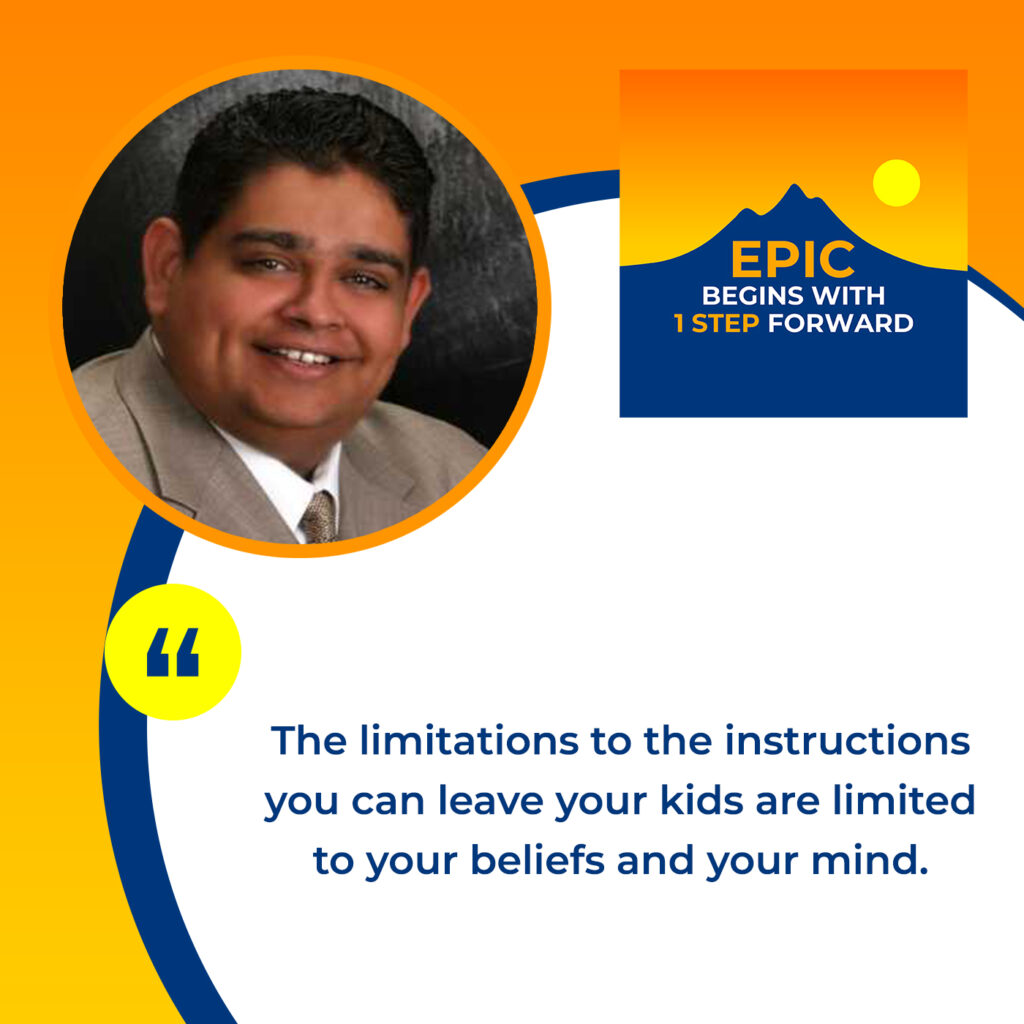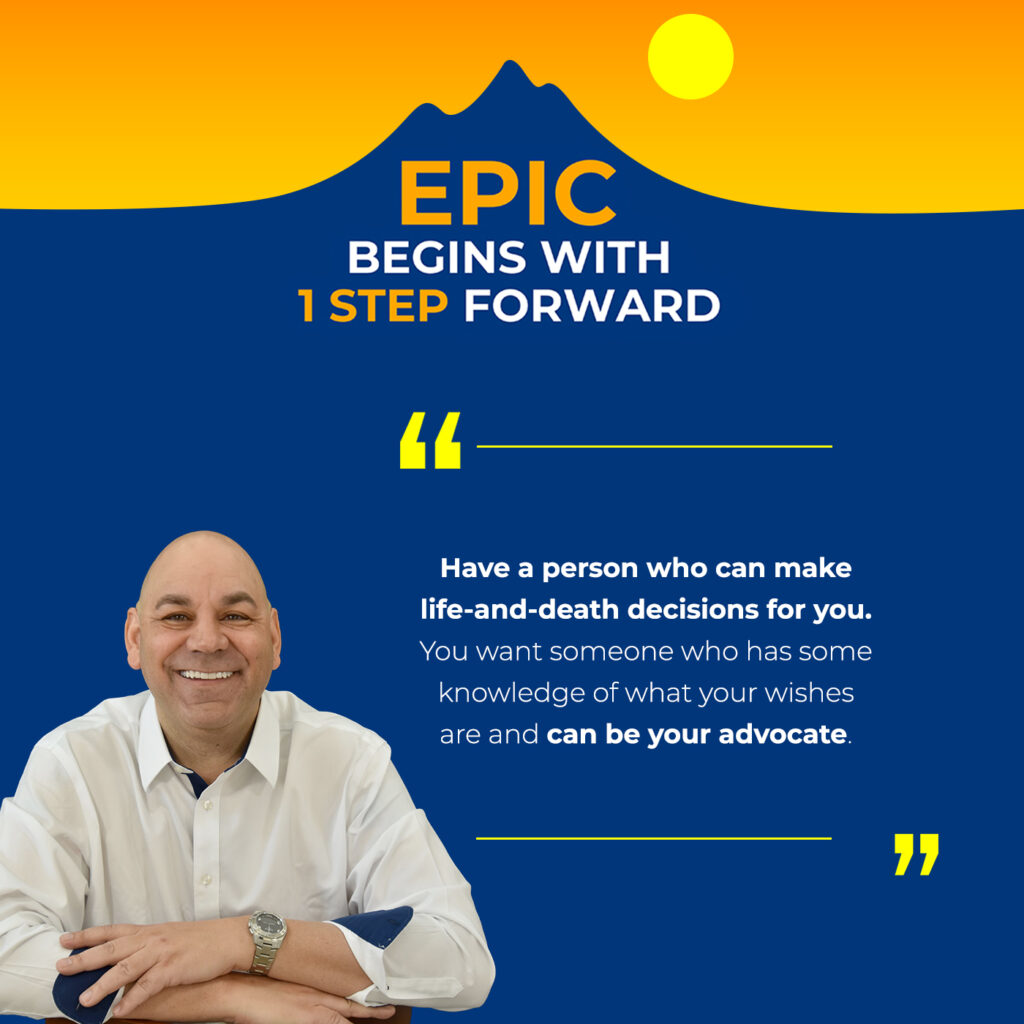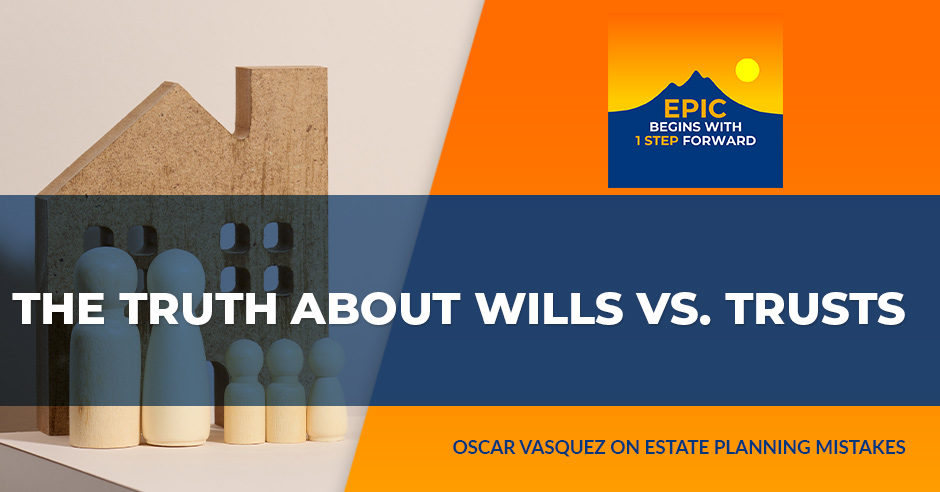#EPICBeginswith1StepForward #ZanderSprague #WillsVsTrusts #EstatePlanning #AvoidProbate
—
Watch the episode here
Listen to the podcast here
The Truth About Wills Vs. Trusts: Oscar Vasquez On Estate Planning Mistakes
I am so honored to be joined by Oscar Vasquez. Oscar, tell us who you are and what you do.
First of all, thank you for having me on your show and helping me with my crusade of bringing awareness to living trust and estate planning. I’ve been a real estate licensed broker for many years, and I’ve been helping families buy and sell homes. A few years ago, I started knowing that as my clientele got older, they would pass, and they would go into probate. I started referring them to attorneys, and now we have created a software that’s now affordable and that is available to people nationwide.
What Is A Living Trust
It is an important subject. It’s part of the reason I wanted to have you on. One of the things I talk about in my book is what I call epic unexpected. Those are the things that happen unexpectedly. Sadly, people passing, it can happen quite unexpectedly. If you haven’t taken care of setting up your estate for your surviving family, it can be a very long and tedious process. Oscar, thank you so much for trying to make what is decidedly a complex thing perhaps a little easier. Let’s talk about some of the different aspects of setting up your estate. First, what is a living trust?
Before I go in, I want to add more about the epic unexpected because here’s the thing. Sixty-eight percent of homeowners in America don’t have an estate plan or a living trust. I came on this crusade because the only reason I can think they don’t have it is because they don’t know. I think that when you have the unexpected, it’s because you don’t know. You don’t expect it because it’s unexpected.
By bringing the education and bringing this crusade, or the crusade that I’m on, is to bring that education to people. Now they know, now they can’t un-know. Let me go back. That’s a great question. What is a living trust? That is when the attorney kept giving me an explanation, it was like a ten-minute explanation. I said, “Make it simpler so I can understand it.”

This is what Dean did on my head to be able to build out the software. He says, “A living trust is a contract between you and your parents, or the trustee and the kids, the beneficiaries. It’s called a contract because the courts enforce it if it’s not followed. Basically, the contract is your instructions on what you want to have happen to you and your things when you’re not here.” It’s about as simple as they can get, but it’s a very powerful tool, and it prevents a lot of things from happening.
Understanding The Different Types Of Trust
From my own knowledge, I’ve done my estate planning, it is so important because as a parent, I’ve got two daughters. I want to make sure that I’ve taken care of them properly. I want to ensure that what my wishes are, are written down, and no one goes, “I believe that dad wanted this.” If I didn’t write it down, no one knows. Here’s the question, Oscar. There are different types of trust. There’s a living trust. There are legacy trusts.
The revocable trust can convert into a legacy trust. I’m going to tell you, the revocable living trust is the one that, if you’re a homeowner, you should start with. Revocable means that while you’re alive, you can make all the changes you want. You can disinherit, inherit. You could add, delete, remove, and just do different things. I had a question at the workshop, and it was a great question. What is the limitation to the trust as far as instructions?
I thought about that. The answer that I came up with, the limitations to the instructions you can leave your kids are limited to your beliefs and your mind. I’ll give you some of the a-ha moments that I had. She was an educator, because we work with a lot of educators. We did their living trust. One of the things that she put on there, one of the provisions, was that the proceeds from the rental property, she wanted to sell them.

She wanted to keep the proceeds in the trust. The money was supposed to go in disbursements to her son. She only had one son. He had a disease with alcoholism and drugs. One of the provisions that she put on there is that he had to submit a drug test every month by the 28th and the disbursements were going to be done on the 5th. If he tested negative, he got the disbursement.
I was like, “Wow, really?” She said, “He’s going to remain sober when I’m here, and when I am dead, he’s not going to abuse or get sick, or whatever that happened, whatever his reason is, that’s not going to happen.” That was the first provision that made me go like, “What a thought.” The second one that was a huge a-ha moment for me was when we did a special needs trust for a child. One of the traditions in their family, since she was twelve, is that every year, they go to an amusement park, and they have this calendar on the refrigerator with all the days, like how many days are left. Every day, she’d go tear one out.
She goes out and does that. She goes, “I want to make sure that if I go before her, which I wish that happens.” Nobody wants to bury their child. She put in $10,000 now. It accumulates interest in the trust. The instructions were, there would be enough money to pay for all expenses for four tickets to any amusement park she would want to go to. What they did is they had a list and they would go. She wrote out, “These are the instructions I want on my trust.” I was like, “That’s amazing. What a thoughtful process.” She goes, “Oscar, she looks forward to that day more than Christmas.” The limitations are there, and the provisions are there.
I’m going to give you a couple of misconceptions that most people have. The biggest misconception is that a will is enough and then a living trust. I’m going to give you the difference, and then I’m going to give you all the benefits of what the trust does and all the things that the will does. The difference between a will and a trust is simple. A will is two pages if an attorney writes it. If you get it online, it’s one page. The will says, “I love you. I give you everything.”
In California, the longest legal provisions that have to be in there to be a legal trust. It’s 142 pages. I think the lowest is Arkansas, which has 105 pages and all the provisions that need to be in there. That’s the difference as far as the legal provisions. A will will not prevent you from going to probate. You still have to go to litigation. The court still decides in probate what happens to your things. The court makes the final decision. The will is the instructions to the judge telling them, “This is what I wish to have happen.”
A living trust is about as simple as they can get, but it is a very powerful tool that prevents a lot of legal hurdles from happening.
A living trust prevents you from going to court because it has all the legal provisions, and it’s an enforceable contract that your kids have to follow. There is no probate. In California, speaking of the awful word probate, I know because I worked with clients on it, here are the four things that happen in probate. One, the court decides what happens and has the final decision on what happens to your things. Somebody can mistakenly get disinherited, or somebody could not get their equal portion of what you want to have happen.
Two, in the state of California, probate starts at $26,000. That is what it costs. The third thing is that it gives you a new tax basis. For example, if you bought the home for $100,000, and when you die, it’s worth $1 million because everything in California is worth more than $1 million. Mobile homes are now $890,000. Just kidding.
I’m in California, so yes, absolutely.
You’re in California? Where are you?
I’m up in the San Francisco Bay Area.
Up there, everything’s $5 million. It’s up there. Anyway, so super expensive. When you pass, the kids now have a tax basis of $1 million. They no longer have that tax basis of $100,000, and that’s across all properties. That includes investments, your investment property or anything else. That’s a tax basis. The fourth and final thing that I think should be number one, but the fourth thing, is that your kids and your loved ones have specific instructions of exactly what you wanted to have happen. There’s no debate between siblings about, “Mom wanted to be buried in the North or the South.” There’s no doubt. This is what she wanted.
By leaving specific instructions to your kids and loved ones, there will be no debates among them when you pass away.
Importance Of Estate Planning And The Challenges Of Probate
Estate planning is important. I’ve had a little experience with that. My older sister was murdered when she was 30 and didn’t have any estate planning, as very few 30-year-olds think about that. Although she didn’t have a large estate, there was still stuff that my dad had challenges doing. The number of death certificates that he had to obtain to be able to send in to say, “My daughter, Pat,” to close bank accounts. She had some student loans that were being forgiven. Understandably, you’ve got to prove that this person is deceased. It was a lot of work for him to be able to do that.
It’s seamless, the transfer of it. Here, when you say a 30-year-old, it’s funny because when I get 30-year-olds that come with their parents to a live workshop, they’re like, “Mom, you should get one. It is because you’re getting ready to die. You’re going to die soon.” I’m like, “Anybody could die at any time.”
I can tell you, I know that. What I want to say to my audience is, as Oscar said, in California, the threshold for when you have to go to probate, you may be like, “I don’t have anything.” Honestly, if you own a car, you’re going to probate.
Here’s the provision. I always tell people this. If you want to know when you’re in trouble, Google what is the maximum amount of net worth, that means assets, you allowed before you have to go to probate. In Colorado, it’s $60,000. If you own two cars, you’re going to probate. In California, it’s now $184,000. When people say, “Who should have one?” I always say, “If you own a house, you have to have one. If you own a business, or if you have any kind of digital asset, or if you have any kind of royalty, or a book, or something, a business, an online business that keeps generating income without you, you have to have one.”
A business, anything that has the asset, you go to probate. Here’s the awful thing about probate. The most horrible story I have on a probate is probably where I had a client we never knew, or I didn’t know, because I knew him for fifteen years. He passed away. He had several properties, and one of them sold when he died. The kids didn’t have any havoc. He didn’t do a living trust. He just didn’t get to it. He said, “I think Will’s going to have it.”
They did a publication, and he had three kids in Texas. He wanted to leave 100% of his estate to his 4 kids, not the 3 kids. Three kids showed up, and the courts separated it and gave them equal shares by seven. It took the whole estate, $3 million, and divided it by 7 instead of by 4. His kids got shorthanded. They got disinherited by a little bit, but it’s enough that it stings when it’s that substantial amount. That could be $10 or $50. When you don’t get it, it’s enough.
I know this seems perhaps a sad thing, to be thinking about our own demise, but it is important. I can tell you that my dad, when he passed, he had his estate done like it was airtight. My mom and dad are residents of Florida. Even then, it still took about a year because in Florida, even though my mom was named the executor, everything was taken care of.
They still had to go to the court to have my mom officially named the executor so that she could do all the things for my dad to close out his estate. In Florida, it takes a long time because there are a lot of older people. It was a very minor thing. It was honestly, go before the judge. Judge goes, “Yes.” It still took a year to get the date to be able to go in and have the judge look at all the paperwork and go, “Everything is in order.”
In California, it’s 12 to 18 months to do probate. You have to wait another twelve to be able to settle the estate. It could be another 6 to 12 months to settle it. That means, imagine you passing away, your kids were taking care of you, they had no income, and they were living off of your assets because they were taking care of you, if that was the case. They’re not going to get any financial support or have any access to your things for 12 to 18 months, for two years. How do you survive with that? That’s crazy.
Probates take months to be settled. Without the right preparation, your kids could be taking care of your passing without their own incomes and while living off of your assets.
Important Legal Documents For A Living Trust
Aside from the living trust, what are other things that people need to have considerations for their estate?
A living trust, in the estate plan, it’s an umbrella that has several emergency legal documents. One is the pillar, the living trust. The second document is your financial power of attorney in case you become incapacitated. That means that they can pay your bills. I’ll give you an example of how that was used. We had a client, her husband was a truck driver, who got into a car accident. With the power of attorney, she was able to withdraw from the 401(k) because he was incapacitated. Most people say, “I already have her as a beneficiary.” She only has access to it when you’re dead. She will not have access to the money to be able to spend it.
They withdrew enough money so she could stay with him in the hospital for six months until he came home. She said that alone was worth it. He always jokes, “Oscar, I probably would have been out of there in 90 days if it weren’t for her.” You have the power of attorney. That’s how you could use it. The second thing is the healthcare directive to be able to make medical decisions for you if you are incapacitated. That’s the second document that comes with a comprehensive living trust. What we have is that we offer a comprehensive living trust, which is always here.
The third document is what’s called a guardianship plan for your children that are under the age of eighteen. They’re like, “Why would I need that?” I said, “Let me tell you, there are three sections to a guardianship plan. One is temporary. The temporary guardianship plan that helps you in that document is, mom and dad go to dinner, and they get into an accident. They become incapacitated.” If you do not have a guardianship plan with rights on there for your kids, your kids go to social services, which I call child jail.
If parents get into an accident without a guardianship plan, their kids will go social services.
They go into that until somebody claims them. They say, “Are you their family? Are you this? Who are you?” Until they verify everything. That could take 2 to 3 days. One, we ask for you to designate a temporary guardian. Two, you have what’s called a permanent guardian. That means, when you pass, what happens to your children and where are they going? Who’s taking care of them?
The third is, I call it the drunk uncle clause, which is, who do you not want your kids with? You have those. Those are probably the most important documents. There are up to twelve different documents, but those are the most that should be and go into. Everything goes in subject to and customized to everyone’s needs. Those are probably the four pillars of an estate plan.
I do want to say that having a health proxy and advance directive is important because you may have very strong feelings about, should you be incapacitated, what you do or don’t want to have happen. Some people feel strongly that you should do whatever you have to do. I want you to save me. Other people say, “If it’s determined that basically all I’m going to do is be ‘alive’ but on a ventilator, kept alive artificially, that’s not what I want,” you can put it down. It has to be followed, no matter whether your children are like, “No, you’ve got to save mom or dad.”
No. They’ve made it clear. You, as a competent person, have said, “I want this and I don’t want this.” This is important. That health proxy is someone that you trust. You should, when you name them, say, “I want you to understand here are my wishes.” That person is going to make what is possibly life-and-death decisions for you. It is hard. You want someone who is going to be able to do that and who has some knowledge of what your wishes are so that they can be your advocate.

I forgot to add one last thing on the health care directive. You also have what’s called a HIPAA waiver. What happens is, if you show up to the hospital, that’s one of the documents you sign when you’re in the hospital that they allow you to have. If you show up incapacitated, they won’t give your children the medical records because you did not sign it. You, having that HIPAA waiver that’s on there, that is attached to the health care directive, can get a second opinion and get the medical records, which can give you peace of mind all in itself.
Another thing that I think is important is, if you do have a health care directive, if there is a local hospital that you’re likely to be taken to, you can have an electronic copy already in their system. Should you show up, all of that is already there. I had an accident years ago. I busted my shoulder up. I was going to have to have surgery. Honestly, one of the first things they asked me when I went to the emergency room was, “Do you have a health care directive?” I said yes.
I had it in the system. They looked, and they’re like, “That’s good.” Let me tell you, it’s great that you have it. The people who are going to be your proxy have to know where you have that piece of paper that they can then present to the hospital. Perhaps you want to have the hospital have it in your medical record so that people don’t have to go, “I have to leave the hospital, go to Dad’s house, go try and find it.” That’s not the time for them to find it. It’s going to be hard.
They’re worried about going and being with you. I think those of you who own a home and those of you who want to have your things in order are those things. I say there are two things that are guaranteed in our lives. One is that we’re going to pay taxes.
Death and taxes. There you go.
The second one is we’re all going to die. We should have those things in order to make things easier for our kids. We should say for our loved ones because our brothers and sisters and all of our family, our loved ones, should make it a lot easier for them in that process.
Free Gifts And Resources From Oscar
Oscar, this has been fascinating. How can people find your software, find you?
There are a couple of things I’d like to give you. I’m going to give everybody a free comprehensive estate guide. If you go to EstateDocPrep.com/guide, you can download a free guide. It’s about 31 pages. It’s all the questions of the most important five documents that you should have in an estate plan. It even has questions like, “Who are you going to have 1, 2, and 3?” and you can put those, and you can have it as a full disclosure. Just because you filled that out doesn’t mean you have a living trust. It is because those are just a workbook, a guide.
The second thing that I like to give you is a phone number. If you have questions, we have an artificial intelligence AI where it answers all of your estate questions for anybody across the United States. It doesn’t have any provisions. The phone number is 805-909-4689. Here’s the best thing about her. She answers every time. She doesn’t take breaks. She’s not a salesperson. She’s just there to educate. At the end of the call, she’ll say, “Is there anything else? Is there any way else that we can give you more information or book a call or whatever?” She’ll answer any questions you may have at no additional cost.
The last thing, I’d like to give you a gift of anybody that’s reading. On our website, it’s $2,497, but if you use the code EPIC, we will give you $1,000 off for a lifetime value of the software. Here’s where most of the value comes in on the software. Every time you have a restatement, a change on your living trust, it’s anywhere from $1,200 to $1,800 to redo it. With the software, it’s a lifetime access for updates. You have an update. You can update it. The younger you are, the more updates you’re going to have because more things change in your life.
You can use the discount code EPIC. It’s good for ten viewers who take action. We’ll give you a discount of $1,000. You’ll be able to get it for $1,495. Those are the three gifts that we have for you. I leave you with this. To do something yesterday, it’s too late. Tomorrow, you don’t know if you’re going to be here. Today is the only day that you could do something. Take action.
Oscar, thank you so much for all of those wonderful gifts. Thank you so much for coming in. Wonderfully educational.
Thank you very much. Once again, thank you for helping me on my crusade to bring awareness to estate planning. Thank you so much.
I want to remind everyone that if you’re ready to begin your epic journey, go to EpicBegins.com. As always, remember, epic choices lead to the epic life that you want.
Important Links
About Oscar Vasquez
 Today, we have Oscar Vasquez, founder of EstateDocPrep.com, joining us! Oscar is an expert in estate planning who helps families and homeowners protect their assets from the high cost of probate.
Today, we have Oscar Vasquez, founder of EstateDocPrep.com, joining us! Oscar is an expert in estate planning who helps families and homeowners protect their assets from the high cost of probate.
From creating living trusts to avoiding costly estate planning mistakes, Oscar’s insights could save you thousands and provide peace of mind. If you’re a homeowner, you can’t afford to miss this conversation. Let’s dive in with Oscar Vasquez!

